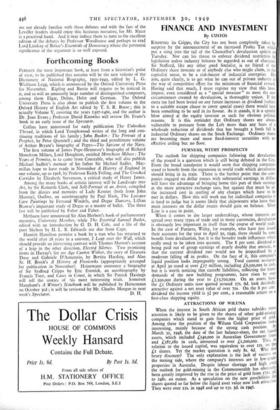FINANCE AND INVESTMENT
By CUSTOS
Ktiow, Dm its Cripps, the City has not been completely taken by surprise by the announcement of an increased Profits Tax which put a sting into the tail of the Chancellor's devaluation sp&ch on Tuesday. Nor can his threat to enforce dividend restriction by legislation unless industry behaves be regarded as out of character. Sir Stafford, like any other good Socialist, is no friend of the Ordinary share investor or of anybody else who might claim, in the capitalist sense, to be a risk-bearer of industrial enterprise. His aim, quite clearly, is to get what he can out of private industry in the way of competitive effort for the minimum of financial reward. Having said that much, I must register my view that this latest impost, even considered as a " special measure " to meet the new circumstances created by devaluation, is thoroughly unjust. If the extra tax had been levied on any future increases in dividend (subject to a suitable escape clause to cover special cases) there would have been something to be said in its favour. As it stands, it is a spiteful blow aimed at the equity investor as such for obvious political reasons. It is this reminder that Ordinary shares are always vulnerable to pressure from the Left more than any fears of a wholesale reduction of dividends that has brought a fresh fall in industrial Ordinary shares on the Stock Exchange. Ordinary shares are becoming more and more fixed-interest securities with an effective ceiling but no floor.
FURNESS, WITHY PROSPECTS
The outlook for shipping companies following the devaluation of the pound is a question which is still being debated in the City. From the broad standpoint it would seem that shipping companies stand to benefit from the expansion in world trade which devaluation should bring in its train. There is the further point that the com- panies engaged on dollar routes with substantial earnings in dollars will have the advantage of bringing home this part of their earnings at the more attractive exchange rate, but against that must be set the increased cost in sterling of any charges which have to be met in dollars. How this will work out for individual companies it is hard to judge but it seems likely that shipowners who have their main interests on the dollar routes should gain on balance. Silver Line is a case in point. When it comes to the larger undertakings, whose interests are spread over many types of trade and in many currencies, devaluation is obviously less important in itself than the course of world trade. In the case of Furness, Withy, for example, who have just issued their accounts for the year to April 3o, 1949, there should be some benefit from devaluation, but it is the broader trade influences which really need to be taken into account. The 8 per cent. dividend is being paid out of group earnings of .nearly double that amount, so that the current dividend rate would not be jeopardised by a moderate falling off in profits. On the face of it, this company liquid position looks impregnably strong. Total current resources' at April 3o stood at over £17 million, including £6,5oo,00o in cash, but it is worth noticing that cuffed liabilities, reflecting the heavy demands of the new building programme, have risen by over £2,300,000 during the year to L13,700,000. On an assets basis the Lt Ordinary units now quoted around 27s. 6d. look decidedly attractive against a net asset value of over 7os. On the 8 per cent. dividend the income yield is 51 per cent., a reasonable return on a first-class shipping equity.
ATTRACTIONS OF WILUNA
When the interest in South African gold shares subsides more attention is likely to be given to the shares of other gold-mining companies which stand to gain from the higher price of gold. Among these the position of the Wiluna Gold Corporation looks interesting, mainly because of the strong cash position. At March 31, 1948, the date of the last balance-sheet, the net liquid assets, which included £54o,000 in Australian Government loans. and L387,280 in cash, amounted to over £1,zoopoo. This, inrelation to the issued capital, was equivalent to over I25. on the £i shares. Yet the market quotation is only 8s. 6d. Why tha heavy discount? The only explanation is the lack of succe, on the mining side, where the company's interests are in low-urade
.
properties in Australia. Despite labour shortage and high cog) the outlook for gold-mining in the Commonwealth has obviously been greatly improved by the rise in the price of gold from 1725.to 2485. an ounce. As a speculation on the new possibilities the shares quoted so far below the liquid asset value now look attractive. They were over 12s. in 1948 and up to 155. 3d. in-1947.














































 Previous page
Previous page